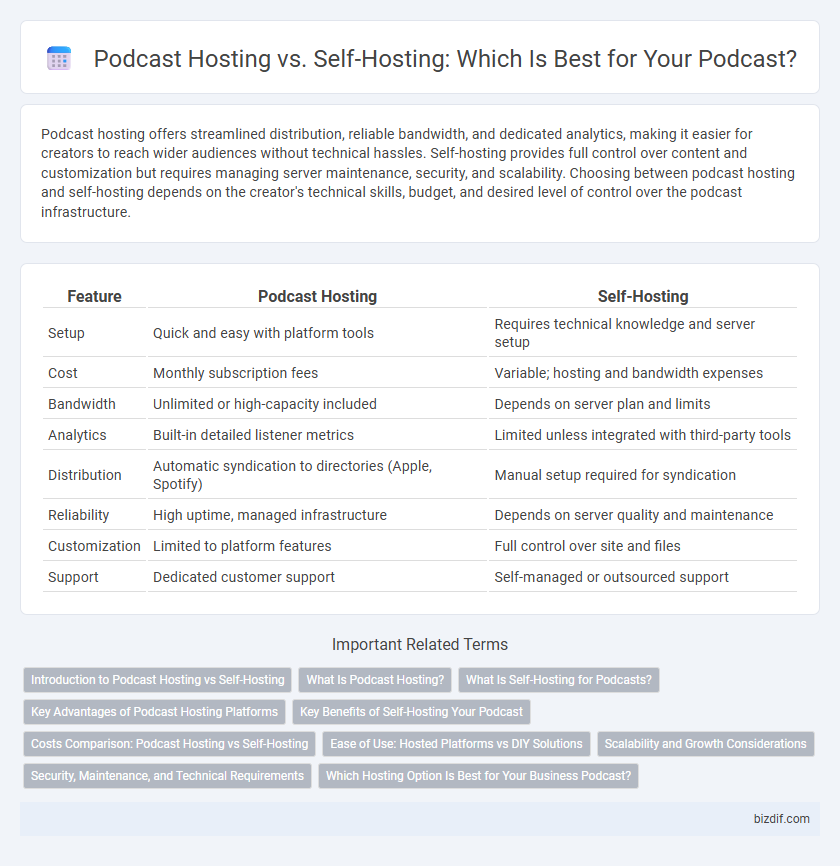Podcast hosting offers streamlined distribution, reliable bandwidth, and dedicated analytics, making it easier for creators to reach wider audiences without technical hassles. Self-hosting provides full control over content and customization but requires managing server maintenance, security, and scalability. Choosing between podcast hosting and self-hosting depends on the creator's technical skills, budget, and desired level of control over the podcast infrastructure.
Table of Comparison
| Feature | Podcast Hosting | Self-Hosting |
|---|---|---|
| Setup | Quick and easy with platform tools | Requires technical knowledge and server setup |
| Cost | Monthly subscription fees | Variable; hosting and bandwidth expenses |
| Bandwidth | Unlimited or high-capacity included | Depends on server plan and limits |
| Analytics | Built-in detailed listener metrics | Limited unless integrated with third-party tools |
| Distribution | Automatic syndication to directories (Apple, Spotify) | Manual setup required for syndication |
| Reliability | High uptime, managed infrastructure | Depends on server quality and maintenance |
| Customization | Limited to platform features | Full control over site and files |
| Support | Dedicated customer support | Self-managed or outsourced support |
Introduction to Podcast Hosting vs Self-Hosting
Podcast hosting involves using dedicated platforms like Libsyn, Anchor, or Podbean, which offer streamlined distribution, analytics, and storage solutions optimized for audio files. Self-hosting requires managing your own server or website, giving full control over content and customization but demanding technical expertise and maintenance. Choosing between podcast hosting and self-hosting impacts scalability, ease of use, and long-term management of your podcast episodes and audience analytics.
What Is Podcast Hosting?
Podcast hosting refers to third-party platforms that store and distribute podcast audio files, ensuring reliable streaming and downloadable access for listeners. These services provide essential features like bandwidth management, analytics, and easy integration with directories such as Apple Podcasts, Spotify, and Google Podcasts. Choosing podcast hosting simplifies technical tasks, enabling creators to focus on content while maintaining optimal performance and audience reach.
What Is Self-Hosting for Podcasts?
Self-hosting for podcasts involves the podcaster independently managing their audio files on their own server or web hosting service instead of using third-party podcast hosting platforms. This approach offers complete control over distribution, metadata, and monetization strategies but requires technical expertise to handle bandwidth, storage, and RSS feed maintenance. Self-hosting can optimize SEO by allowing customized directories and direct access to audience analytics without relying on external hosting providers.
Key Advantages of Podcast Hosting Platforms
Podcast hosting platforms offer streamlined distribution across major directories like Apple Podcasts, Spotify, and Google Podcasts, enhancing audience reach without technical complexity. They provide built-in analytics tools that track listener demographics, episode performance, and engagement metrics, enabling data-driven content strategies. Automated episode scheduling, easy RSS feed management, and integrated monetization options simplify podcast production and growth, making them ideal for creators seeking efficiency and scalability.
Key Benefits of Self-Hosting Your Podcast
Self-hosting your podcast grants full control over content distribution, data analytics, and monetization strategies without reliance on third-party platforms. It enhances security by reducing the risk of platform-related outages or content removal, ensuring uninterrupted audience access. Self-hosting also allows custom branding and integration with other digital assets, improving listener experience and long-term scalability.
Costs Comparison: Podcast Hosting vs Self-Hosting
Podcast hosting platforms typically charge monthly fees ranging from $10 to $50, offering integrated distribution, analytics, and storage, which simplifies management and reduces upfront investments. Self-hosting demands purchasing server space, bandwidth, and maintenance tools, potentially costing $100+ monthly depending on traffic and storage needs but provides full control and customization. Evaluating costs includes considering scalability, technical expertise, and long-term expenses, where hosting services offer predictable pricing while self-hosting may incur variable and higher operational costs.
Ease of Use: Hosted Platforms vs DIY Solutions
Podcast hosting platforms provide user-friendly interfaces, automated distribution, and reliable analytics, making them ideal for creators seeking simplicity and efficiency. DIY self-hosting requires technical skills to manage servers, configure RSS feeds, and ensure uptime, often leading to a steeper learning curve and potential maintenance challenges. Hosted solutions streamline episode management and audience engagement, while self-hosting offers customization at the cost of increased complexity.
Scalability and Growth Considerations
Podcast hosting platforms provide scalable infrastructure with dedicated bandwidth and storage, enabling seamless growth as listener numbers increase without technical constraints. Self-hosting demands robust server capabilities and ongoing maintenance to handle traffic surges, potentially leading to higher costs and downtime risks during audience expansion. Opting for managed podcast hosts ensures automatic scalability and reliable performance, crucial for sustained podcast growth and distribution efficiency.
Security, Maintenance, and Technical Requirements
Podcast hosting platforms offer robust security protocols, automated backups, and regular updates, minimizing risks of data breaches and downtime. Self-hosting demands advanced technical skills for server management, ongoing maintenance, and implementing SSL certificates to ensure secure content delivery. Choosing between the two depends on the creator's ability to handle complex configurations versus prioritizing ease of use and professional support.
Which Hosting Option Is Best for Your Business Podcast?
Choosing between podcast hosting and self-hosting depends on your business's technical resources and scalability needs. Podcast hosting platforms offer user-friendly interfaces, reliable distribution, and detailed analytics, ideal for businesses seeking ease and professional support. Self-hosting provides full control and customization but requires advanced technical skills and ongoing maintenance, making it suitable for businesses with dedicated IT teams.
Podcast hosting vs self-hosting Infographic

 bizdif.com
bizdif.com